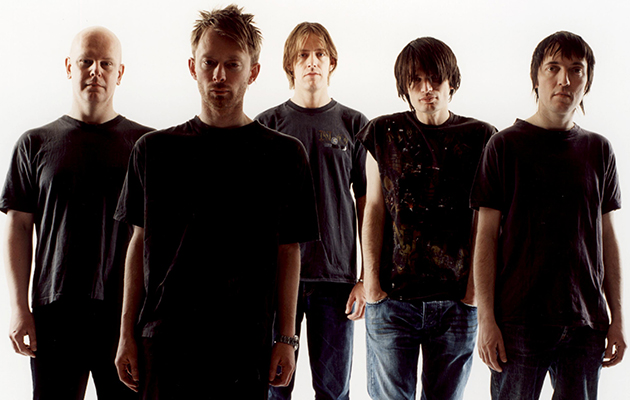After 10 years of “not being able to really connect with anything,” Thom Yorke has guided his bandmates into radical new territory. As Kid A arrives, however, JAMES OLDHAM discovers how Radiohead’s reinvention was critical to the band’s survival. Are all the bandmembers delighted with the ch...
The next time NME catches up with Radiohead, it’s mid-August, and they’ve just played the first date of their British tour in Newport. The atmosphere onstage has changed markedly, with the chatty bonhomie of the summer having given way to something far nervier. The crowd too seem muted and confused by the new material. Meanwhile, in the press, stories have begun to circulate that Kid A was to be called ‘ENC’ (or ‘Emperor’s New Clothes’), but the label refused to allow it. The band, however, seem oblivious to the gathering storm clouds.
“You’d be apprehensive if you were playing in front of your home audience,” insists Colin equably. “There were nine to ten thousand people there tonight… We can’t just play in pretty places in the South Of France; that would be really crap. It was our first show, and we’re trying to do everything differently with the sound and lights.”
It hasn’t made you apprehensive about the way Kid A is going to be received, then?
“Not really. We’ve lived with the music for about a year now and I still like it. If you’re in a band and you become very professional and slick, I think you have to pull the rug out to survive. Thom was saying tonight when he came off that he really enjoyed it, because there were moments of chaos and frenzy and doubt and success and failure, all happening in an hour-and-a-half. We don’t want boredom to set in.”
Jonny, too, is optimistic: “My experience of the album from having given it to friends, is that after hearing it once, there’s two songs that you really like, but the more you hear it, the other songs start to take over. Hopefully, your relationship with the album will change. Different songs will make sense after a period of time.”
What about all the songs that didn’t make it onto Kid A? You seem to have deliberately left off all the catchy ones.
Colin shifts in his seat. “When we did OK Computer,” he sighs, “the first single we released was ‘Paranoid Android’, which was six-and-a-half minutes, and what I hope we’ve done with Kid A is what we did with ‘Paranoid Android’. We’ve put a record out that’s taking things a little bit further, and we hope people have the patience to deal with it, and then next year we’ll put out more music that we’ve been playing live, and that people will be prepared for. If you want to hear songs like ‘Knives Out’, come and hear us play it and then we’ll release it in March next year.”
In light of the fact that people understand the difficulties surrounding the making of this record, and the fact that it represents a massive stylistic shift in your sound, don’t you think you should have done more press explaining all this?
“Do you feel like you’re being jilted or left at the altar?” laughs Colin. “There’s no axe to grind. Isn’t this better than sitting in a hotel in North London? [We’re currently sitting in a freezing kitchen in South Wales] We’re trying to be more open and less confrontational.”
“I think we realised with The Bends and OK Computer,” concludes drummer Phil Selway, as their tour manager beckons them away, “there was an awful lot of energy going into things like interviews, which was taking time away from the really important parts of being in a band, making music and the whole visual side of it. We’re not putting two fingers up at anybody; we’re just trying to find a balance at the moment, and we may well have not got it right yet.”
The balance that Phil is talking about doesn’t just extend to the press. The fact is that following OK Computer was always going to be a near impossible task, and Radiohead have opted for a route, which, first and foremost, ensures their survival. Kid A sounds like what it is: a record that’s been slowly and painstakingly edited together. It’s a brave, but flawed affair. It attempts to mimic the arrhythmic sounds of Autechre and Aphex Twin, but ends up mired in compromise.
Aphex Twin works outside the music industry, releasing records when and where he wants, under his name and others. If Radiohead had wanted to, they could have followed suit. As it is, they’re still tied to the rock band aesthetic, determined to play gigs and trade on personalities. Under their current setup, all attempts at electronic radicalism come across as diluted and arbitrary. Worse, it’s arguable that they’ve missed the point about what made them sospecial in the first place. OK Computer wasn’t fantastic because it was radical sonically, but because the quality of songwriting was exceptional. Kid A sees them abdicating that responsibility, as if Thom was frightened he couldn’t reach the same standard (hence the exclusion of all the actual ‘songs’).
Making experimental music is the easy way out. For Radiohead, and in particular Thom Yorke, it seems to have been the only way. Time will judge it. But right now, Kid A has the ring of a lengthy, over-analysed mistake.
This interview – alongside other expansive features, new reviews and more – are printed in Uncut’s Radiohead Ultimate Music Guide – limited copies are still available to buy now.



